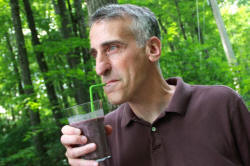|
 'Superfood'
craze makes big business of Africa's baobab 'Superfood'
craze makes big business of Africa's baobab
 Send a link to a friend
Send a link to a friend
[August 01, 2018]
By Edward McAllister
Mangoule, SENEGAL, (Reuters) - Taerou
Dieuhiou has been shinning barefoot up baobab trees in Senegal's
southern Casamance region to collect the oblong fruit since he was 15.
|
|
 Business has never been better. Inside the hard, green shell that
dangles from the spindly branches of Africa's most iconic tree is a
citrussy pulp that has become a popular "superfood" in the United
States and Europe. Business has never been better. Inside the hard, green shell that
dangles from the spindly branches of Africa's most iconic tree is a
citrussy pulp that has become a popular "superfood" in the United
States and Europe.
Rich in vitamin C, calcium and magnesium, it can be ground into a
powder, mixed into smoothies or sprinkled on porridge. Coca-Cola's
Innocent, U.K. yogurt maker Yeo Valley and U.S. wholesaler Costco
are among the major brands to embrace baobab.
The imposing tree dots the dry African savannah from Senegal to
Madagascar and can live for over a millennium. It can store
thousands of liters of water and grow trunks so thick that one South
African tree became a pub with a dart board that could hold 60
people.

Until recently baobabs were only tapped for local use but in a major
business shift a small network of producers and suppliers has pushed
the fruit's profile abroad. While some experts question the boabab's
sustainability, demand has taken off.
"It is a better price now. Now I make more for each sack," said the
31-year-old father of four. He climbs the trunks in ripped jeans and
a t-shirt, gripping a long pole to dislodge the fruit from the outer
branches. "It's all I have."
[to top of second column] |

Exports of the hard-shelled fruit rose from 50 tonnes in 2013 to 450
tonnes in 2017, according to industry group the African Baobab
Alliance. They are expected to reach 5000 tonnes by 2025, about 500
shipping containers a year. This would make it a $400 million
industry.
The transformation has started to bring in much needed revenue to
African farmers. Baobab des Saveurs, a small company with buyers in
Australia and Canada pays Dieuhiou up to 10,000 CFA francs ($18) per
sack, more than double what he received from local middlemen a few
years ago.
"A GREAT AFRICAN TREE"
Slaves shipped from West Africa in the eighteenth century wore
necklaces of baobab seeds for luck and to remind them of home. Today
it is used locally to treat liver disease and malaria in rural
Senegal. Herders in Niger mix it with grains to make gruel.
[© 2018 Thomson Reuters. All rights
reserved.] Copyright 2018 Reuters. All rights reserved. This material may not be published,
broadcast, rewritten or redistributed.
Thompson Reuters is solely responsible for this content.
 |